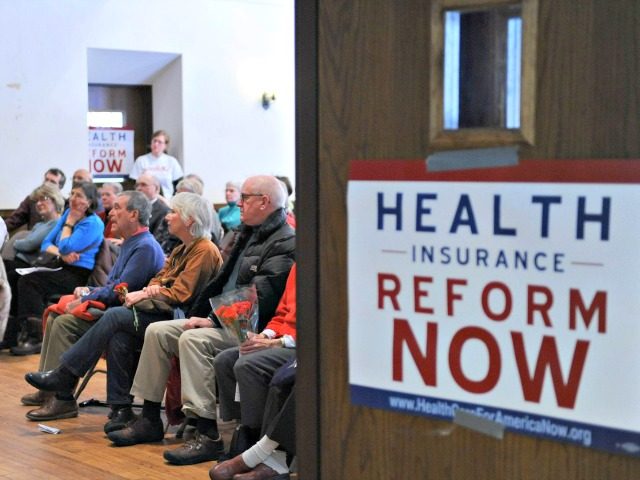A Heritage Foundation study released Wednesday found that the first drop in Obamacare premiums was driven by the Donald Trump administration’s approval of health insurance waivers that gave states the option of regulatory relief from Affordable Care Act (ACA) mandates and regulations.
The Heritage Foundation released a study Wednesday which found that through the Trump administration’s approval of Section 1332 ACA waivers, they were able to lower health insurance premiums for the first time in Obamacare’s history.
Before Trump took office, Obamacare individual market premiums more than doubled, from $2,784 in 2013 to $5,712 in 2017, which represents an increase of 105 percent. In October 2018, the Centers for Medicare and Medicaid Services (CMS) announced that premiums had dropped by 1.5 percent, the first drop in Obamacare’s history. In 2019, Obamacare benchmark plans fell by 0.83 percent.
Heritage Foundation senior fellow Doug Badger found that the large drive of health insurance was driven by the Trump administration’s approval of 1332 waivers, allowing states to offer Americans greater relief from the high premiums of Obamacare.
Badger’s study discovered that the seven states that obtained waivers led the drop in premiums. Premiums in the waiver states fell by nearly 7.5 percent, while premiums in the other 44 states under Obamacare rose by more than three percent.
Section 1332 of Obamacare allows states to seek waivers from certain federal health insurance regulatory mandates. States can apply for waivers under this provision from the CMS to receive a portion of the federal premium subsidies that otherwise would go directly to the insurance companies to instead lower the cost of Obamacare enrollees who incur high medical bills.
Badger found that in some states, they could experience a dramatic drop in premiums through the 1332 waiver for 2020, including:
- A negative 16 percent drop in Colorado.
- A negative 13.7 percent drop in Delaware.
- A negative eight percent drop in Montana.
- A negative 19.8 percent drop in North Dakota.
- A negative 5.9 percent drop in Rhode Island.
The Heritage Foundation scholar urged states to make greater use of 1332 waivers to reduce health insurance premiums. As the White House reportedly moves towards releasing its long-awaited healthcare plan, Badger said that Congress should push towards an Obamacare repeal proposal that would move healthcare regulation towards the states.
Badger explained:
States would use this new flexibility to reinvigorate broken private insurance markets and focus subsidy funds on low-income households and those in greatest medical need. States would be required to use a portion of their federal allotment to finance risk-mitigation strategies, which have proven effective at reducing premiums. And, every individual who qualifies for a subsidy would be able to apply it to coverage of his choice.
While it has been possible to reduce premiums across some states by using 1332 waivers, CMS Administrator Seema Verma has warned that many Americans who cannot receive Obamacare subsidies continue to flee the ACA exchanges because the “sky-high premiums” are too “unaffordable.”

COMMENTS
Please let us know if you're having issues with commenting.